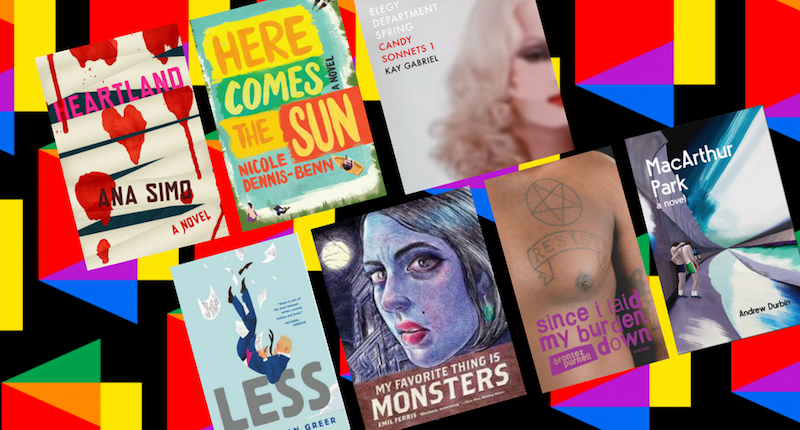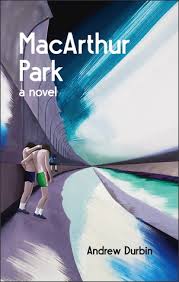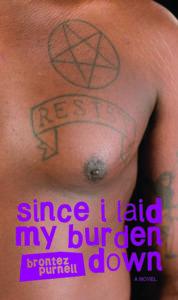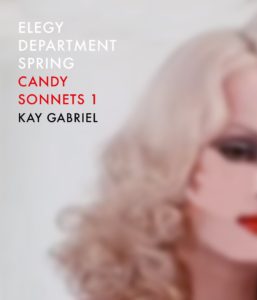
All throughout June, in honor of Pride month, Book Marks is spotlighting LGBTQ stories. Lambda Literary is an organization that does this vital work year-round, promoting LGBTQ books, advocating for LGBTQ writers and, as they write in their mission statement, “elevating the impact of their words to create community, preserve our legacies, and affirm the value of our stories and our lives.”
We’re delighted then, as we celebrate some of the many wonderful LGBTQ authors at work today, to have Lambda Literary’s Program Director, William Johnson, recommend seven of his favorite contemporary classics for us.
*

MacArthur Park by Andrew Durbin
MacArthur Park is a skillfully rendered novel of queer millennial angst and affection.
“MacArthur Park, whose title is, yes, borrowed from the Donna Summer classic, contains characters aware of the fact that New York is a modus operandi, one that keeps them interested but kind of miserable … MacArthur Park, is an ecstatic debut from a curious writer. Once a few corners of Durbin’s prose are solidified, his sublime aspirations for fiction are ones that will be of larger intrigue outside the New York bubble that is probed in this thought-provoking novel.”
–Christopher Stewart (The Lambda Literary Review)
*

Since I Lay My Burden Down by Brontez Purnell
A punk-rock novel of Proustian-like remembrance, Since I Lay My Burden Down chronicles one gay man’s riotous home-coming.
“In his debut novel Since I Laid My Burden Down, Brontez Purnell strings the narrative of his protagonist DeShawn–a black, gay punk living in Oakland–along the deaths of four men in his life. The novel opens with DeShawn fidgeting in the pew of the rural Alabama church he fled as a teen, back there to bury an uncle. Purnell lulls his audience by starting here, the familiar sight of a gay black boy wilting beneath the summer heat and the disparaging gazes of his Southern kinfolk. But DeShawn is actually here to take account of his own life, what has become of the restless boy he once was, before setting out for Northern California. The novel chronicles DeShawn’s life in Oakland, before returning to confront the male ghosts still haunting him in Alabama.”
–Frederick McKindra (The Lambda Literary Review)
*
My Favorite Thing is Monsters by Emil Ferris
My Favorite Thing is Monsters is a powerful graphic novel that works as both a gripping mystery and an empathic coming-of-age story.
“‘Sometimes you don’t let yourself know what you know,’ writes Karen Reyes, the 10-year-old narrator of Emil Ferris’s debut graphic novel, My Favorite Thing is Monsters, Volume 1. The text is made up of the pages of Karen’s notebook, where the aspiring artist records her thoughts alongside careful renderings of the images she encounters around her, from the walls of the Art Institute in her Chicago home to the covers of the pulp comics that she collects. While most girls she knows seek out models in the glossy pages of teen magazines, Karen begins to ‘let herself know what she knows’: her queer identity, through finding herself in the demons, vampires, and other monster figures she finds in both camp horror and high art. She draws herself as a werewolf, chasing after beautiful women while on the run from mobs of villagers.
Karen’s search for clues to her identity is one of several mysteries woven into the overarching whodunit story at the center of My Favorite Thing is Monsters. Karen’s beloved neighbor, a Holocaust survivor named Anka, dies mysteriously in what is ruled a suicide. Karen, however, is convinced that Anka was murdered. Recalling another iconic coded queer child, Harriet M. Welsch from Harriet the Spy, Karen dresses as a detective and sets out to investigate who killed Anka.”
–Andrea Crow (The Lambda Literary Review)
*
Heartland by Ana Simo
Can a novel be “gleefully” dystopian? With Heartland, writer Ana Simo makes the case for this new genre distinction.
“Categorized as ‘literary dystopia’ and ‘lesbian pulp noir’ by Restless Books, Heartland exists in a liberating matrix of its own creation: one where a book can be politically gifted without having to save the world, and Machiavellian without having to apologize for it.
In our unnamed narrator’s world, a not-too-dissimilar corruption triggered the Great Hunger, during which the so-called ‘flyover states’-including an affluent town named Elmira and the smaller one in which our narrator lived-faced dramatic food shortages; many second-class citizens were moved to resettlement camps as a result. With political tension always visible in the rear-view mirror, our tough-as-nails narrator steers us into the Great Hunger’s aftermath, gradually catching up to her past with minimal sentimentality.”
–Sarah Fonseca (The Lambda Literary Review)
*

Elegy Department Spring by Kay Gabriel
In this stunning chapbook, poet Kay Gabriel psychologically reimagines the life of queer icon Candy Darling.
“The chapbook figures what it means to be young, gorgeous, and bottle blonde, mock-embracing feminine stereotypes and filtering them through the smallest of American small-minded dreams (a line lifted from Candy’s diary: ‘anyone can be beautiful: / at least anyone can have beautiful / hair’) and the most immediate of counter-cultural crises, as in the heartbreak/shotgun line, ‘Holly we miss you, get up.’
Gabriel’s chapbook imagines what happens when Candy Darling never dies, but grows instead, in hiding, over several decades, into the 50 Foot Woman she might have adored as a teen. Why attack when you can howl back as a five-story icon of beauty and resistance? As Gabriel declares, ‘In the age of Revlon you / win or you smudge.’ ”
–Maxe Crandall (The Lambda Literary Review)
*
Less by Andrew Sean Greer
In this Pulitzer Prize winning novel, Greer takes a hard and humorous look at gay middle age.
“Faced with the prospect of turning 50 and attending the wedding of Freddy, his younger ex-lover, mid-list writer Arthur Less decides to play hooky from his life. Cobbling together a peculiar string of literary events that take him around the world, our protagonist ponders his uncertainties over aging and his mounting regret over letting Freddy go … Stylistically, Greer’s use of language, dramatic irony, and a mysterious narrator casts Arthur Less as the unwitting hero in this comedy of errors. Throughout the novel, comedy takes the edge off more serious matters, as we follow Arthur through the Frankfurt airport under the influence of too many sleeping pills, attempting to teach a five week university course in his hilariously faulty ‘fluent’ German, and chasing wild dogs in India. While at times, the narratorial voice can be heavy handed, the mysterious narrator adds an additional layer of comedic framing and dramatic irony. Greer’s talent shows in his ability to transition from laugh out loud moments to serious reflection without creating a novel at odds with itself.”
–Lauren Sarazen (The Lambda Literary Review)
*
Here Comes the Sun by Nicole Dennis-Benn
Here Comes the Sun is a mesmerizing novel of troubled familial ties and uncertain passions set amongst the Jamaican tourist industry.
“How do you save your sister, your lover, your home and your ambition? In this brilliant debut novel, Nicole Dennis-Benn aims to present this riddle through rich prose, crackling dialogue and the lives of three unforgettable Jamaican women, each tangled in a legacy of trauma.
Margot is a woman who has sacrificed her own dreams for her sister’s future. A hotel concierge by day, by night, Margot makes the bulk of her income in the bedrooms of tourists. But when her work day ends, she does not retreat back to the shack in River Bank where her sister and mother live. Instead, she goes to the pink house, where the beautiful Verdene lives. While Margot grinds at the hotel, her mother Delores hustles by selling crafts to gullible tourists, sweet talking them into sales. Though there’s a large amount of vitriol between mother and daughter, they both toil for Thandi, who goes to a good Catholic school and carries the heavy burden of needing be a doctor and bring her family from poverty to success. Thandi, though, just wants to be beautiful, and we first meet her in Miss Ruby’s shack, secretly getting her skin lightened. Thandi loves drawing more than she loves the pressure to become a doctor, but is unsure how to proceed with such a dream.”
–Courtney Gillette (The Lambda Literary Review)
*
Lambda Literary also recently celebrated the 30th annual Lambda Literary Awards, all the winners of which you can find here.

